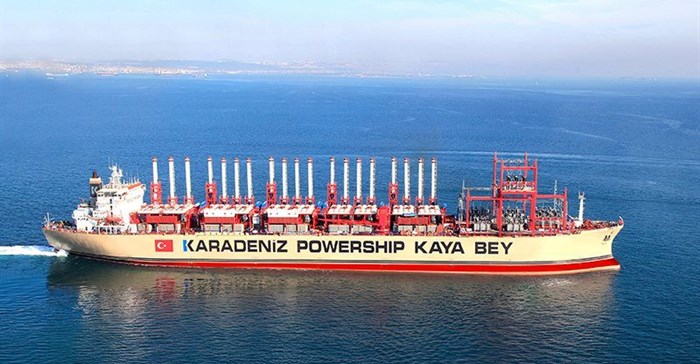
Subscribe & Follow
Advertise your job vacancies
RMIPPPP floating power stations raise questions on carbon emissions
Questions have been raised around governments' reasoning to include three Karpowership floating power plants to provide part of the 2,000MW tendered under the Risk Mitigation Independent Power Producer Procurement Programme (RMIPPPP).

Karpowership vessel, Kaya Bey
Karpowership, a member of Karadeniz Energy Group based in Istanbul, Turkey, produces energy from liquefied natural gas (LNG). The three vessels will be moored at Saldanha, Richards Bay and Gqeberha by August 2022,
The advantages of LNG-to-power are that while much more expensive than coal, it is cheaper than the diesel used to run Eskom’s open cycle gas turbines, they can be operational within 100 days, and do not have the cost implications and time constraints of building power stations on land.
However Karpowership’s 20-year contract could generate close to 20-million tons of carbon dioxide equivalent emissions per site.
Carbon emission concerns
“As the climate crisis intensifies, South Africa should be embarking on an energy transition to non-greenhouse gas emitting renewable energy sources. How do the Karpowership projects make the grade in this context since it will lock South Africa into fossil fuels for another 20-odd years? A much better option would be to rather promote and invest in renewable energy projects, which are normally contracted for around the same period, but which can be far more socially-inclusive and better for the environment," says Liziwe McDaid, Green Connection's strategic lead.
“We are also concerned about environmental safety. Numerous media reports recently confirmed that, in 2020, a senior environmental affairs official was “persuaded” to grant these Karpowerships exemption from conducting mandatory environmental impact assessments. The excuse provided was that South Africa desperately needed extra electricity supplies, due to the Covid-19 crisis. This was later retracted by the Department of Environment, Forestry and Fishing (DEFF), following an outcry from civil society. However, these dangerous compromises that government is prepared to make, on behalf of the people, are very worrying," she says.
“There is no doubt that, as a result of mismanagement and corruption, Eskom has forced the country into a very dangerous corner with its rapidly increasing electricity prices, failing infrastructure, and the resulting load shedding. However, when exemptions like these occur with no rational reason, it creates an environment lacking in transparency and lends itself to suspicion. Should we, in our desperation, just accept any form of power generation, irrespective of its potentially harmful impacts or long-term cost implications?” McDaid says.
Related
SA perfectly placed to lead “green-steel revolution”, needs expanded domestic beneficiation policies 18 Mar 2025 Africa shows great potential in sustainable energy milestones 10 Mar 2025 New standards pave way for green cement 10 Sep 2024 Cambridge researchers break new ground in green cement 24 May 2024 Sasol makes the world CO2 emissions blacklist 17 Apr 2024 Collaboration will ensure smooth ride into clean mobility future 26 Oct 2023







